
I’ve played many a strange and lurid game before but nothing quite on the level of Torment: Tides of Numenera. It’s a melting pot of science-fiction, fantasy, theist philosophy, RPG player agency, and a dash of “Sweet Jesus, what the hell is that thing?” The world itself is bizarre in the extreme, but it goes far beyond the idea of, “it’s strange, which is what makes it unique.” Having such an unusual setting allows for some truly intriguing narrative moments, and presents to the player choices that force them to consider the nature of morality. What is moral in a world that dispenses with so many of the cultural norms that we know and accept? Though I have some qualms with the design and gameplay, these are largely overshadowed by an enthralling and profound narrative.
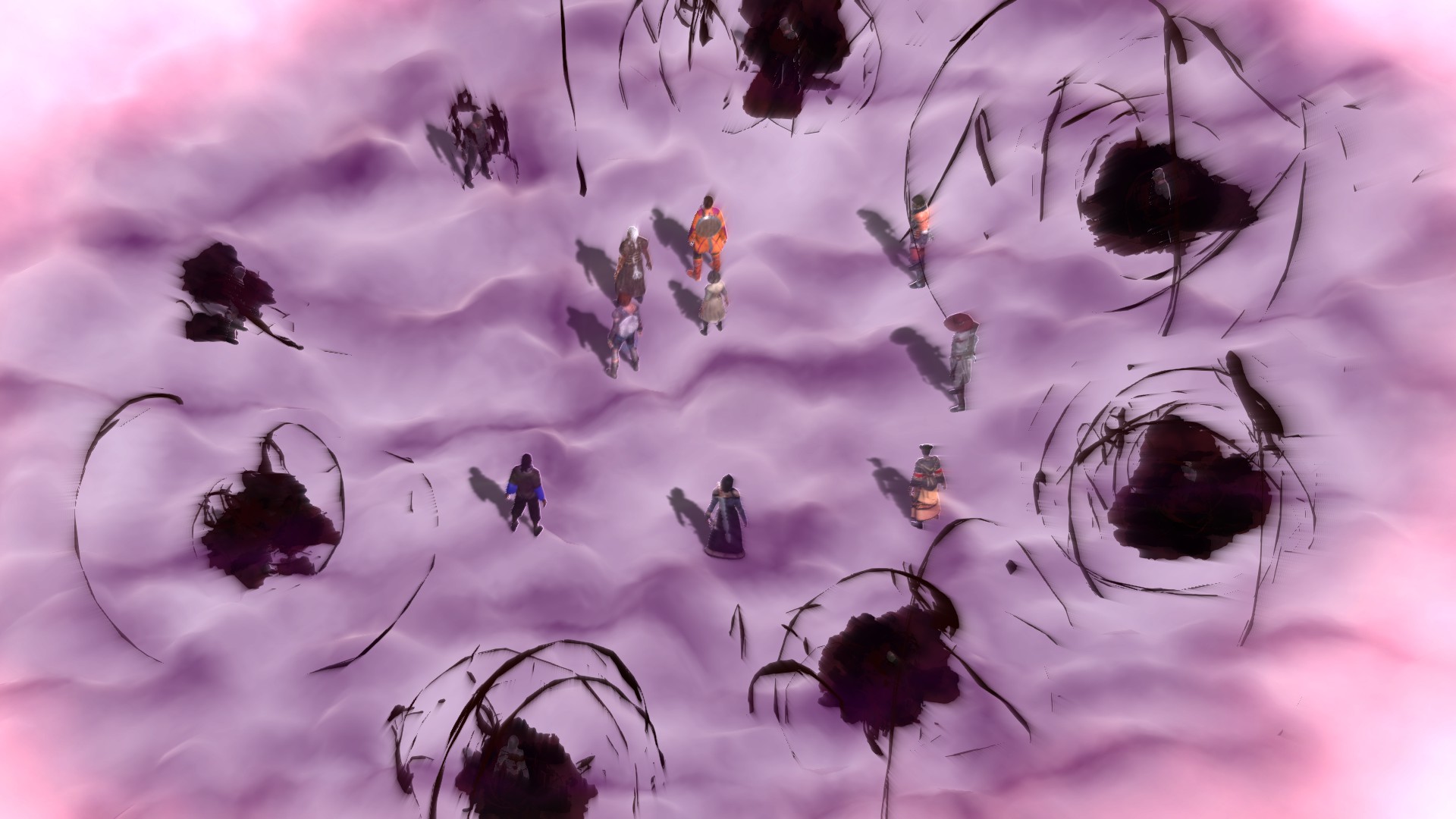
Or just some really strange occurences.
It doesn’t come as a surprise that Torment is based on a tabletop RPG, that being the world of Numenera. Indeed, if you’re not familiar with the source material (and I was not, going into this), even the game’s title is a kind of an enigma to figure out. Just trying to give a rough outline of this game’s story would take up half the article, so I’ll try and boil it down to some really simplified essentials. There’s a dude called The Changing God who has lived for centuries, injecting His consciousness into a new shell whenever He feels like. His actions are either revered or reviled throughout the world but always having a tangible, massive impact on current events. When He leaves a body, it suddenly gains its own consciousness, entirely separate from The Changing God’s, and that’s where you come in as said new consciousness. Revealing much more than that is to gingerly dip a toe into spoiler territory, and would take several paragraphs to fully explain every point.
The world is deep, in the sense that there’s just so much to take in and understand, and it’s esoteric in the extreme. A lot of RPG’s claim to offer morally ambiguous decision making that ultimately falls into a fairly black and white, good or evil presentation of choice but not Torment. Torment does offer the kind of decisions that make you question their morality, since the situation at hand is often so bizarre, so unusual in concept, that conventional thinking doesn’t strictly apply. Is it okay to palm a junkie off to a race of people that will ultimately kill him and steal his body? Especially when the junkie mistreats his own body so, and those who you’re selling him to will otherwise treat him like a king until that point? Also, why are these crystals floating in the air and giggling like children?
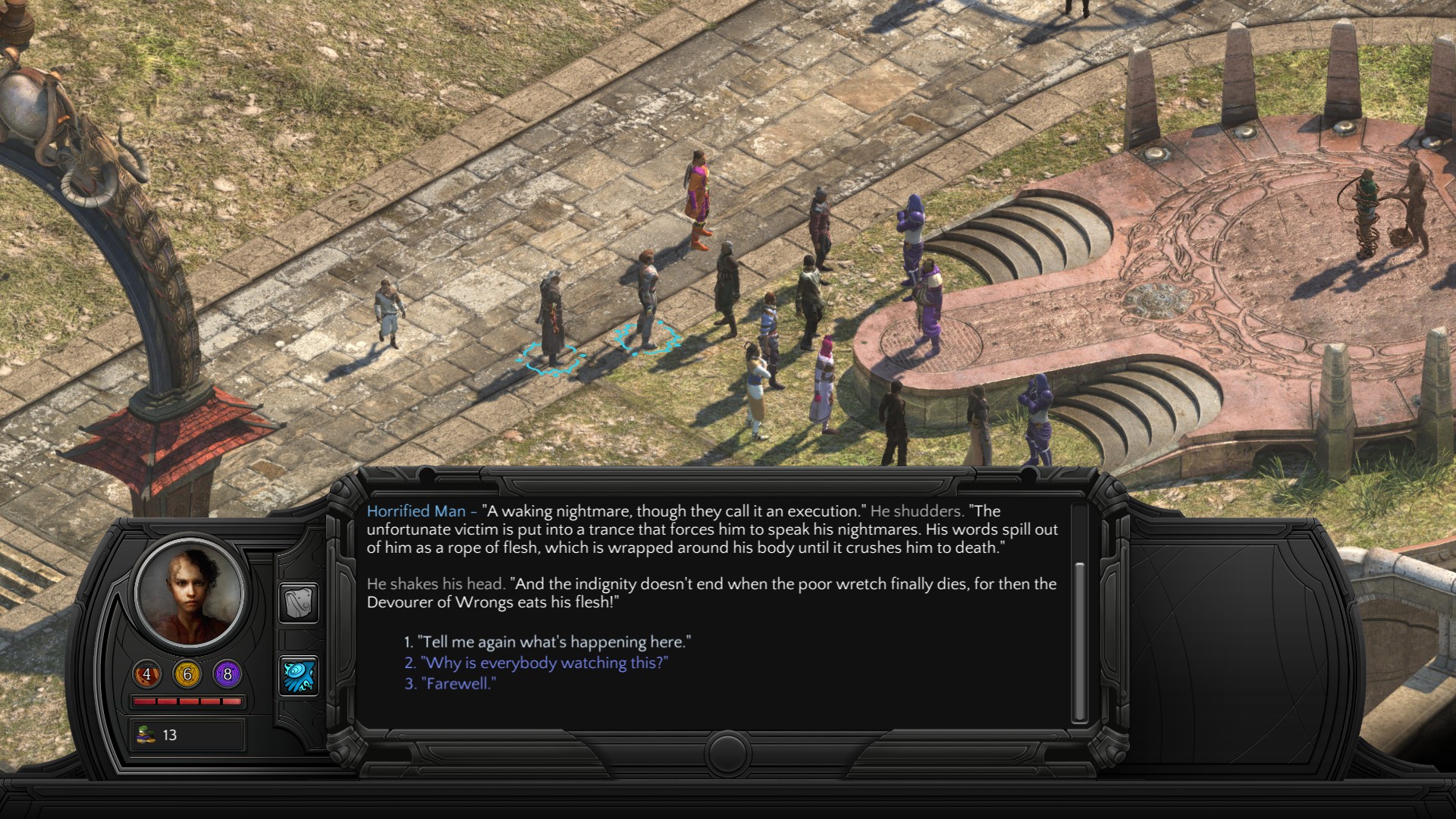
These are the questions that keep a person lying awake at night.
The stat system is pulled straight from the tabletop version of Numenera and implemented in much the same way. You have three pools – Might, Speed, and Intellect – and these can drain fast, depending on how you play. Depending on the kind of player you are, adjusting to this system can be difficult as it’s not exactly flexible. This isn’t strictly a bad thing, it just means that you’re “forcefully encouraged” to stick to the role you’ve created for yourself. If, for instance, you’re a weak-muscled con artist with a silver tongue and a penchant for charismatic embellishment, don’t threaten the big man with the big stick. Though, even then, getting the snot kicked out of you isn’t always a one-way trip to the game over screen either.
Dying and staying dead can actually be somewhat hard to achieve in Torment. Losing all your health will fling you back into a mental construct called The Labyrinth, which you can exit at any point to return to the real world. Depending on when or how you die can affect, or even progress the game in some ways, and it can just as easily happen outside of combat as it can when staring down the aforementioned Mr Big Stick. When you do get into combat, or a “crisis,” where violence is involved, things can be a little janky and uninformative. Visuals cues for things like movement limits, weapon effectiveness, and turn initiative aren’t immediately apparent or sometimes aren’t easy to work out. This is only when you get into combat, of course, since the entire game can also be passed without needing to kill a single person.
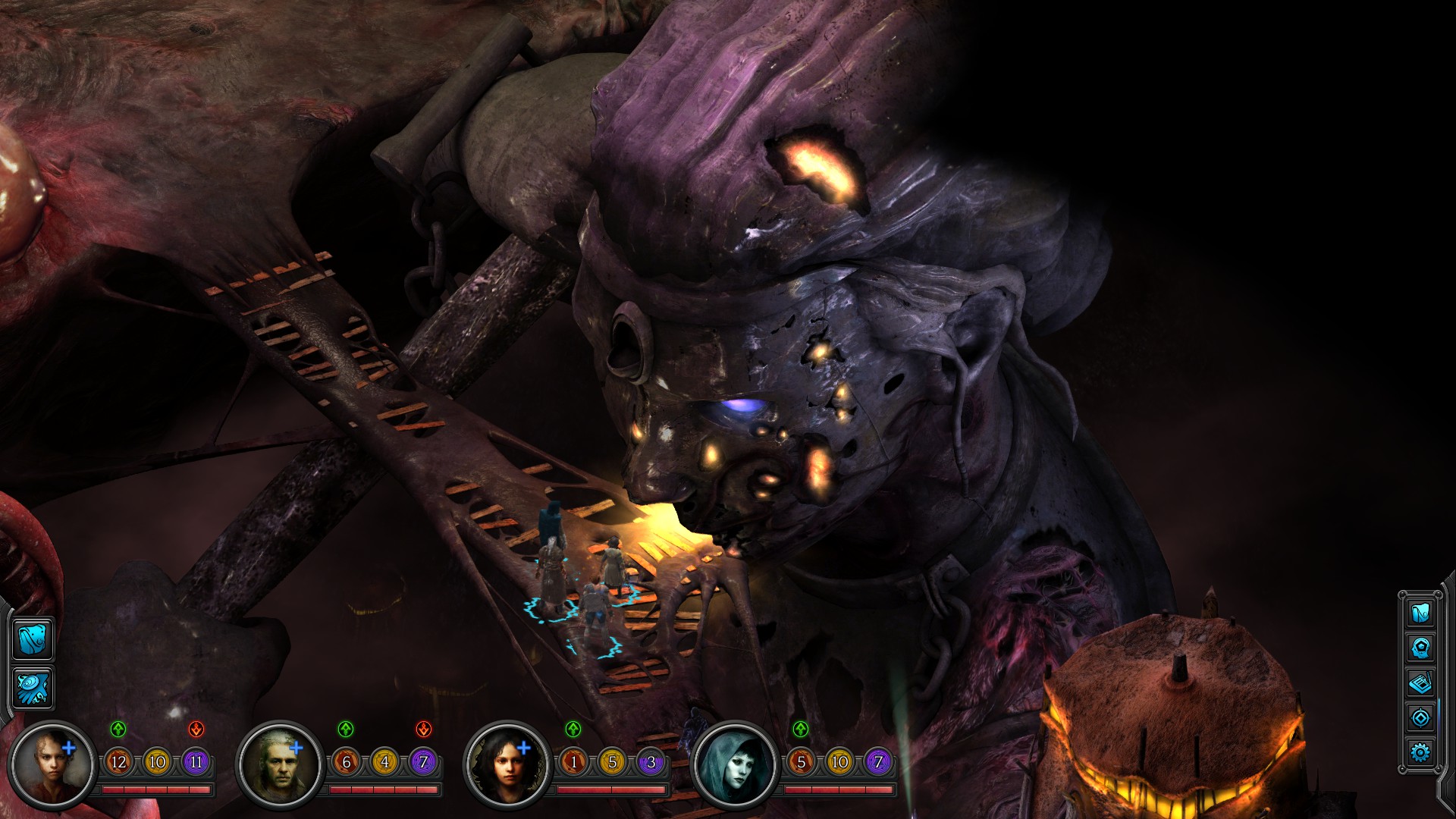
You just have to be prepared to do some potentially dickish things to achieve it, which, honestly, I’m okay with.
As strange as the worlds, concepts, items, and characters can appear, there’s a lot that doesn’t happen on-screen but in the dialogue. Torment is by far and away one of the most text heavy RPG’s I’ve ever played, at many points feeling like an interactive novel of sorts, so be prepared to do a lot of reading. Again, I don’t consider this to be a bad thing, it’s just how the game is presented. You won’t get far without speaking to nearly every NPC you come across, all of who have elaborate backstories, and whose actions are heavily entwined into some quest or another. Torment will also occasionally change to being a kind of “choose your own adventure” text-based adventure now and again. In fact, this is how the game starts out and, if you’re anything like me, it’s possible to outright kill yourself in this introduction before you’ve even gained complete control of your character.
As mentioned earlier, your stat pools will drain over time and, at least at the beginning, will only be good for one major combat crisis at most. You can avoid combat and spread your points out a bit more, which usually requires more investigate work to resolve quests. You can use items to get some back, but the easiest way to reclaim spent points is to rest, which can also progress quest lines in your absence. This sounds restrictive, except it’s hard to fault when “progression” doesn’t just mean, “you’ve not done x in time, now you’ve failed.” Quests can take unexpected turns when you rest, new developments can occur that might actually help in solving them. It’s engaging, and a much better way of dealing with player inaction than just penalising them with a mark of failure.
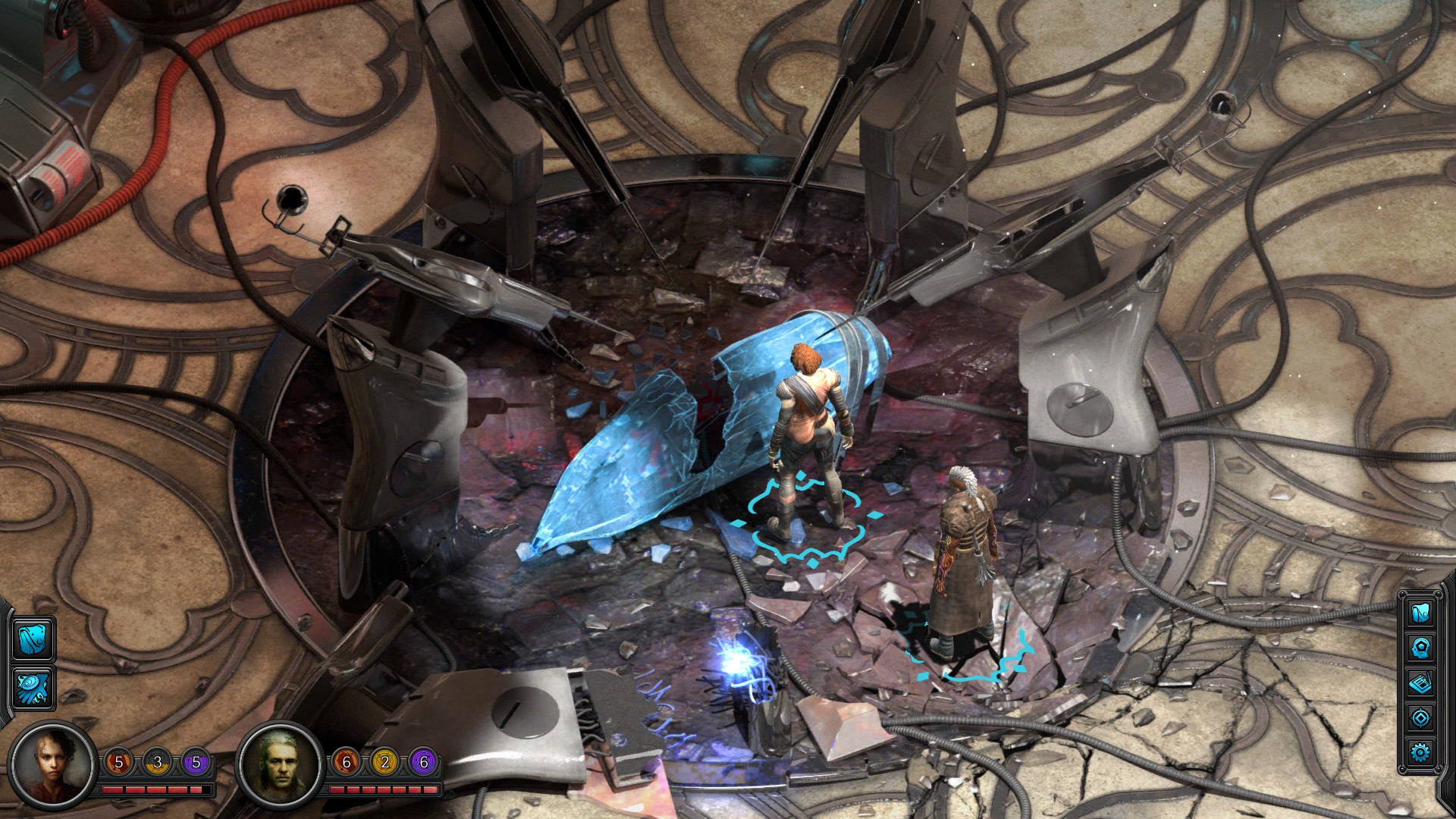
“QUESTLINE FAILED, NO ACHIEVEMENT FOR YOU.”
Be that as it may, I said it was hard to fault, not impossible. While there are usually multiple solutions to a quest, some of those solutions, which can also be the only solution for your character build, are insanely obtuse. The act of investigation can go from interrogating NPC’s for valuable information to clicking on every part of the environment in case it holds an all-important item that you need. Sometimes, once you have that item, you then need to use it in front of an NPC who will react rather than just talking to them about it. Knowing who will respond to something can be incredibly elusive information, however, which leads to just randomly using objects around the place in hopes that someone picks up on what you’re doing.
As mentioned, you have a tenuous immortality that provides a generous amount of plot armour but this doesn’t extend to your companions. They can, and will die, which makes frequent saving across multiple files a must (depending, of course, on how much you care about those companions.) I also grapple with the fact that to follow a particular path, either completely violent or non-violent, means betraying the personality you pick for yourself. You’ll likely end up saying or doing something that you won’t agree with, and that often rubbed me the wrong way. There is also an argument that this moral ambiguity is a good thing, however, and that it makes for good story-telling. Regardless of how you feel about it, it still ties in nicely with the central themes of the story. It’s entirely up to you as to how it makes you feel but know that your convictions will be tested.
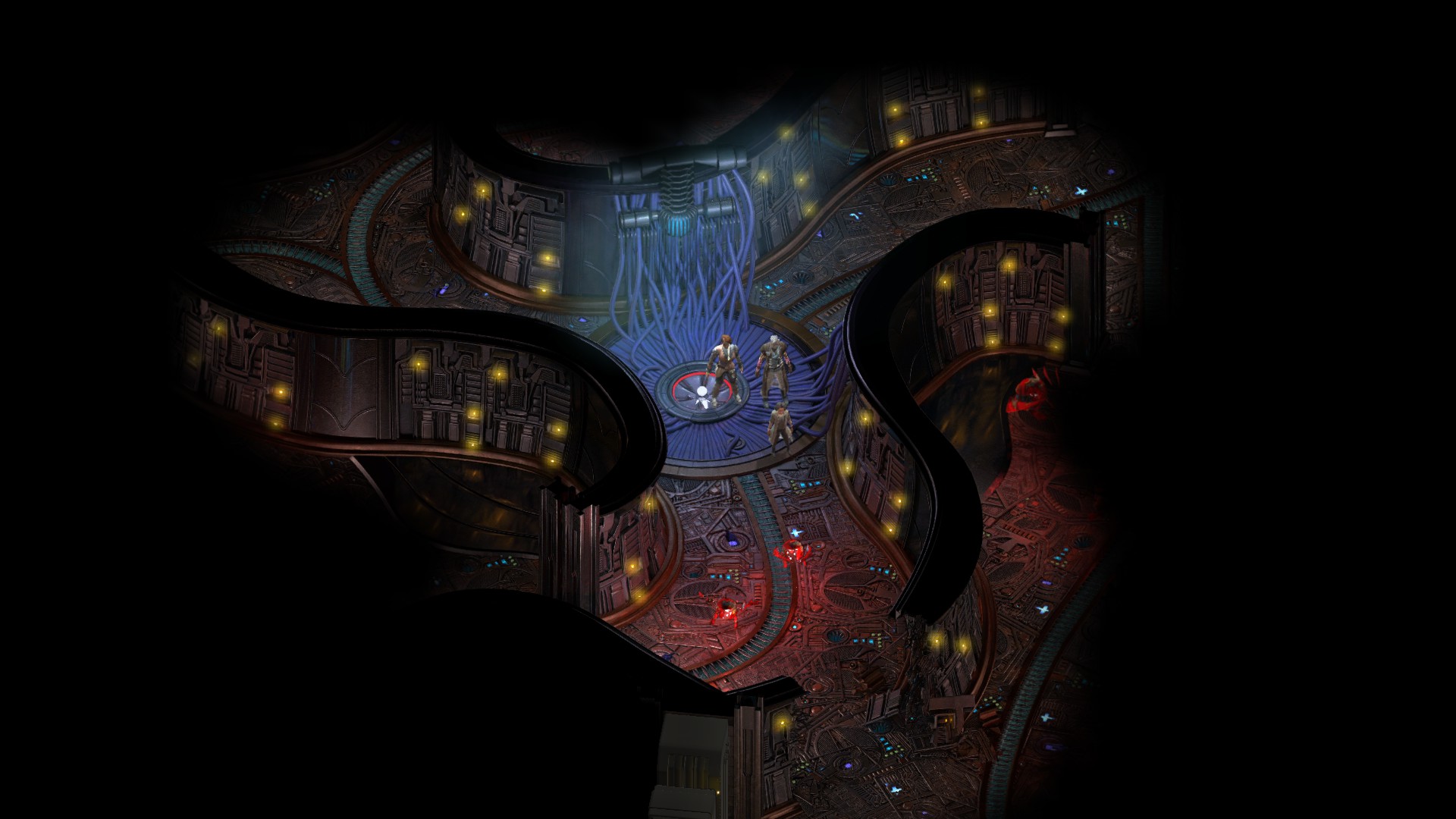
Also know that Tybir will always be a dick, no matter what you do with him.
All of this is presented with some truly inspired visuals, a beautiful interpretation of Numenera’s world descriptions. Before I describe the good, let’s get the bad out of the way. Animations that match what’s written aren’t always present, and changes in your character aren’t always represented in your model. At one stage, I had half my body replaced with a number of enhancements that should have been hard to miss but still couldn’t be seen. Characters deaths of every nature were represented with a sudden explosion of blood from their model, a grunting noise, then falling over and fading away. It’s a minor thing but something that bugged me a lot. For how heavily this game relies on text to convey everything, I was also very surprised by how many spelling or grammar errors that were present.
That aside, InXile have done an admirable job of visually creating things that, by their very nature, are difficult to imagine. What you’ll see ranges from the esoteric, like a reef of forgotten relics from world’s long since lost, to the grotesque, like an entire city house inside a living, bestial organism. The amount of detail in the environment design makes up for the lack of detail in the character models and is arguably more important overall since it’s rare that you get so close to the characters themselves. This also extends to the previously mentioned “text adventure” segments, which are usually accompanied by some gorgeously illustrated stills of what’s happening at the time.
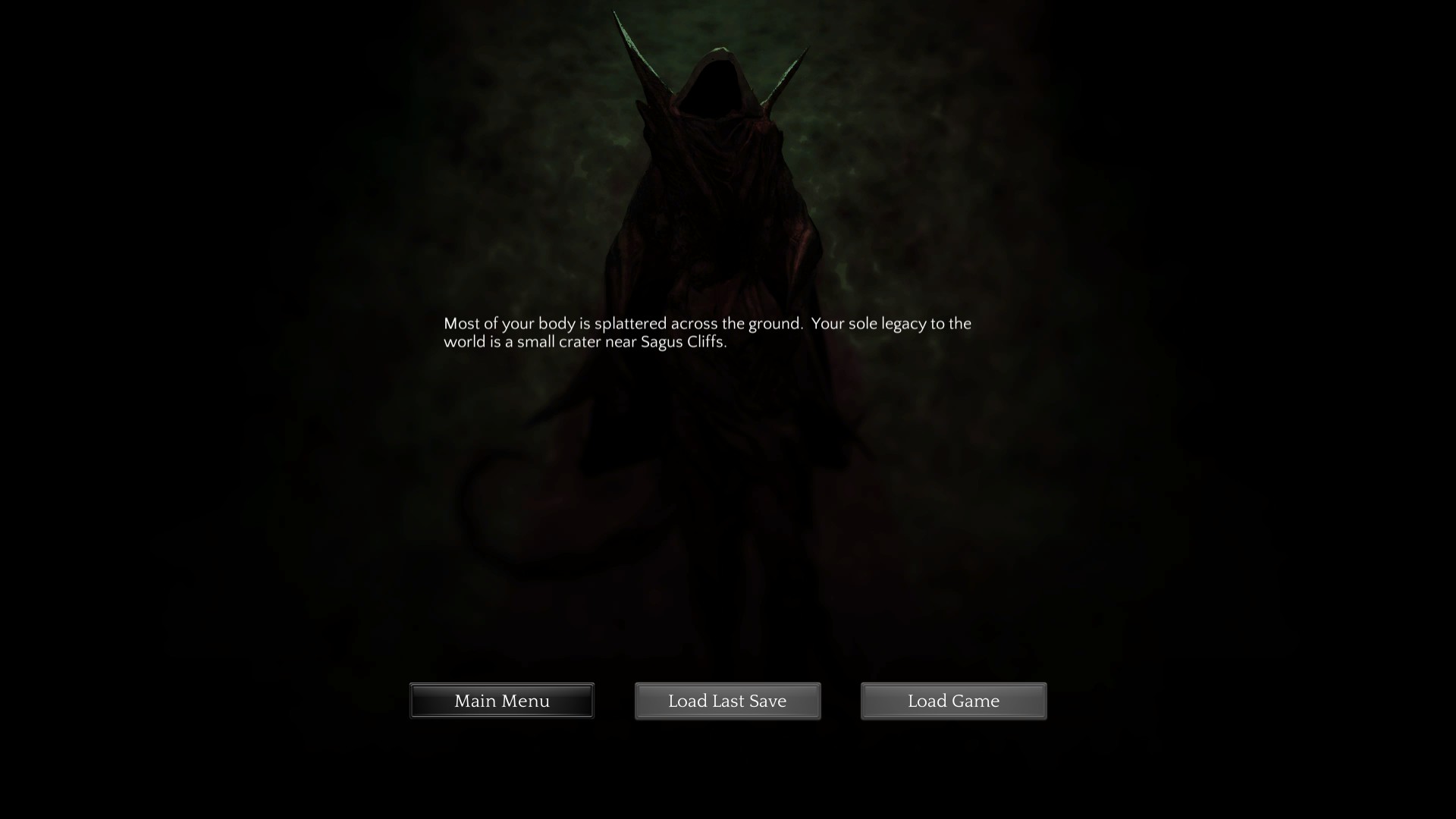
Your untimely death, for instance.
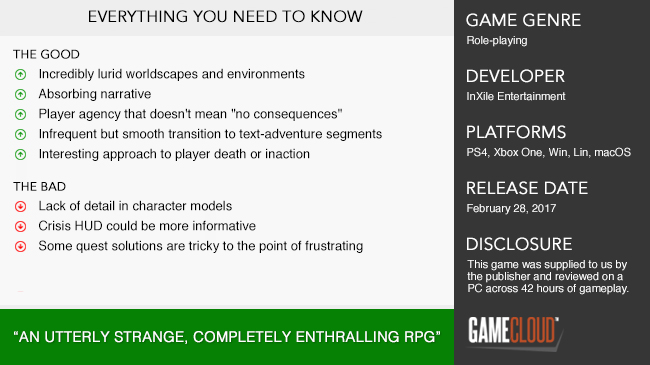
I started Torment: Tides of Numenera blind to the existing fiction and games on which it was based, with a vague understanding that it would be somewhat “unusual.” This would turn out to be an understatement in the extreme, easily being one of the strangest experiences I’ve had in gaming. There are some minor design issues, though they aren’t game breaking and could be seen as non-issues depending on how familiar you are with the tabletop version of Numenera. What matters most, however, is the narrative, which starts out confusing for newcomers and slowly morphs into a mystery that wholly engulfed my attention. I daresay another playthrough would bear a different experience entirely, something I’d happily sink another forty-plus hours into.











